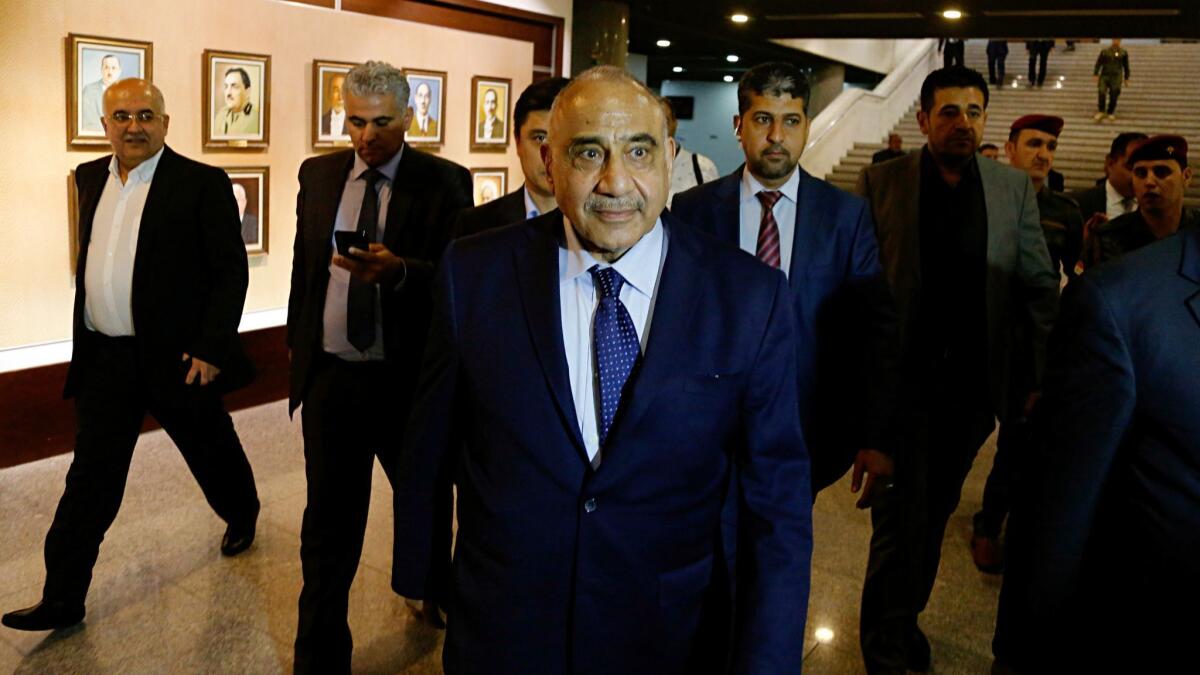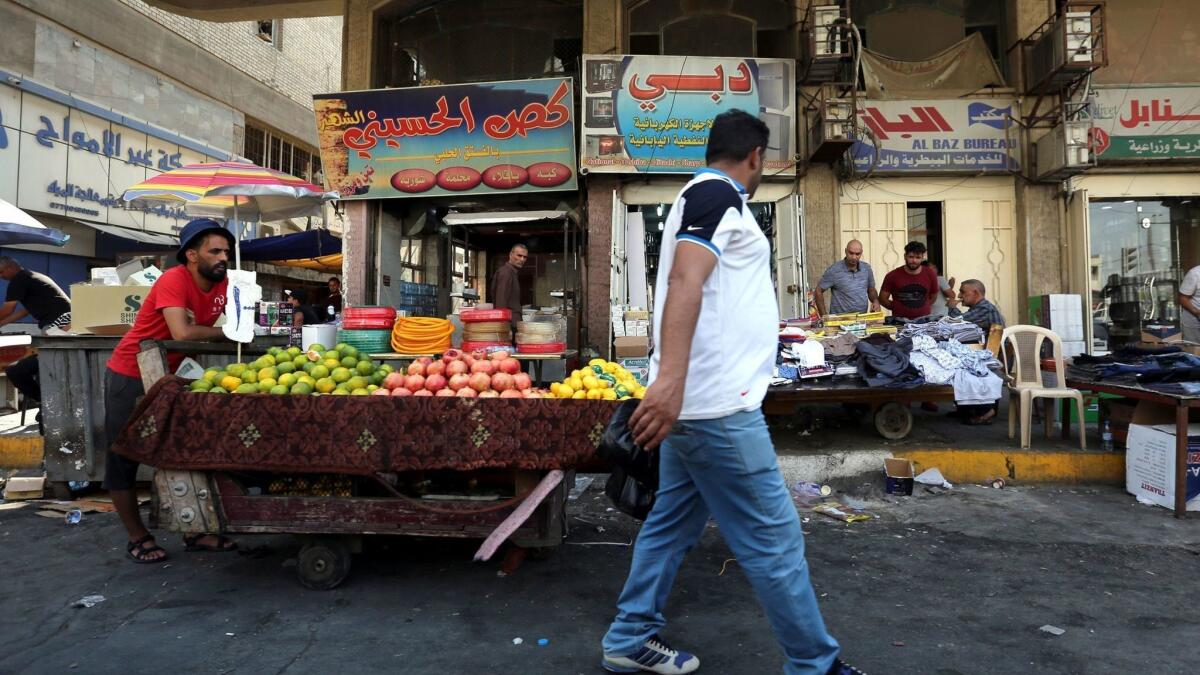Iraq’s new prime minister takes office with goodwill to spare, but few friends in power

Reporting from Beirut — After five months of political wrangling, Iraq’s former oil minister Adel Abdul Mahdi was chosen last week to form a new government — the latest hope for reconstructing a county ravaged by war and hardship.
His predecessors came to power amid existential battles against Islamic State and a Kurdish succession bid that promised to dismember the country. But as prime minister he faces an arguably greater challenge: appeasing an electorate that has lost patience with the entire political class and is eager to see results more than 15 years after the U.S.-led invasion.
An economist who lived in exile in France for many years before returning to Iraq in 2004, he served as finance minister and vice president, and sat on a committee to write Iraq’s constitution in 2005. At 76, Abdul Mahdi is the oldest person to hold the prime minister’s post in the post-Saddam Hussein era, and has a reputation for quitting when things don’t go his way. He resigned as both vice president and oil minister.
“He’s been in the establishment. He was a former communist, then became a Baathist, a Marxist and an islamist .… He is a very close friend to the Kurds,” said Renad Mansour, an Iraqi expert at the U.K.-based Chatham House think tank.
“He’s someone who is respected across the board, and that’s difficult considering how he flipped between parties.”
His supporters point to his status as an independent as proof that Iraq is finally moving away from the sectarian politics that have divided the country. All agree he is an affable man, displaying neither the violent streak of former Prime Minister Nuri Maliki nor Haidar Abadi’s aversion to bare-fisted politics when he led the country.

Abdul Mahdi comes to power very much a compromise candidate, one agreed upon by parliament’s top blocs, including the faction headed by nationalist cleric Muqtada Sadr, and Iran-friendly, Shiite-dominated militias led by former commander Hadi Ameri. Abdul Mahdi also comes with the imprimatur of Grand Ayatollah Ali Sistani, the country’s top religious figure.
Even the U.S. and Iran, two countries that have long used the premiership as a proxy for their own battles, accepted him as a draw: He wasn’t the U.S.’s first choice, but nor was he Iran’s.
“These are people that we know pretty well. They’ve been around the Iraqi government scene for some time,” said U.S. Secretary of State Michael R. Pompeo at a news conference in Washington.
“What we talked about was building out an Iraqi government that was… interested in the welfare and future good fortunes for the Iraqi people, not controlled by the Islamic Republic of Iran.”
The new prime minister will probably continue his predecessor’s balancing act between the two adversaries, said Zaid Ali, an Iraqi analyst and author of “The Struggle for Iraq’s Future.”
Sadr, whose reformist message gained him the highest number of votes in May’s elections, has given Abdul Mahdi one year to “prove his successes before Allah and his people,” according to a statement he released on social media last week.
He has also offered to relinquish his allocation of ministers for Abdul Mahdi to choose “without factional pressures.” (In Iraq’s parliamentary system, winning parties chose Cabinet members depending on their share of the votes.)
Abdul Mahdi will preside over a government restless to rebuild and move past the ravages of war with Islamic State. Yet few investors are willing to help finance a state staffed by voracious politicians.
Meanwhile, thousands of enraged citizens across the country have protested the state’s inability to provide basic services, such as electricity.
And demonstrations like those in the southern city of Basra, where residents fell ill after drinking the water, were so forceful that even Abadi’s own party members abandoned him.
Abdul Mahdi’s independence means he has no party to appease.
Yet, because of that independence, he is answerable to all, said Sajad Jiyad,
“Abdul Mahdi is committed to reforms, but that may not be the case with the rival coalitions that cooperated to nominate him,” Jiyad said.
And most of those parties would be opposed to the reforms Abdul Mahdi would have to consider, such as tightening spending, freezing increases in the number of state employees and security personnel, and working with global organizations to attract foreign investments.
An upcoming budget law will be Abdul Mahdi’s first test, said Ali.
“Regardless of what he tries to achieve, he will face a lot of resistance in parliament, and it’s populated by dozens of parties almost all of which are principally motivated by self-interest,” said Ali.
“A well-constructed strategic budget that doesn’t meet the approval of parliament won’t pass.”
With the war against Islamic State all but finished, people are now expecting the state, with Abdul Mahdi at the helm, to propel Iraq back to its central role in the region, Jiyad said.
“These next four years aren’t about survival, but change and building,” he said. “The war is over; let’s get to work.”
Staff writer Bulos reported from Beirut. Staff writer Tracy Wilkinson contributed reporting from Washington.
Twitter: @nabihbulos
More to Read
Sign up for Essential California
The most important California stories and recommendations in your inbox every morning.
You may occasionally receive promotional content from the Los Angeles Times.










